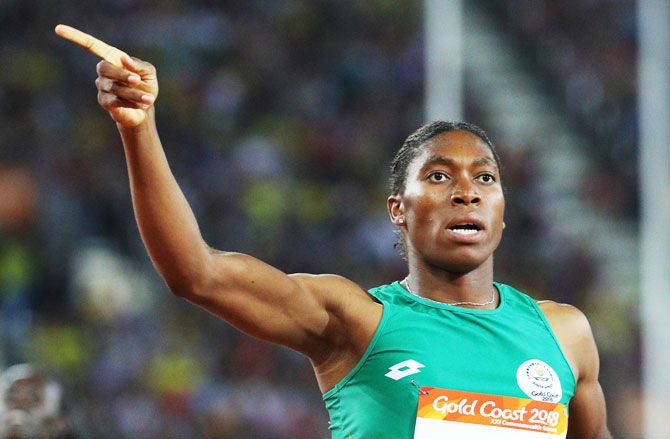
Athletics' new hyperandrogenism rule announced on Thursday has put the spotlight back on South African Caster Semenya's intimate details, which the middle-distance athlete has previously said caused her great distress and embarrassment.
The double Olympic and triple world 800 metres champion faces having to take medication to lower her higher than normal levels of naturally-produced testosterone, which the sport's governing IAAF has deemed gives her an unfair advantage.
Testosterone is a hormone that increases muscle mass, strength and haemoglobin, which affects endurance.
The International Association of Athletics Federations' rule, which comes into force on Nov. 1, is not directly aimed at Semenya but she will be most affected by it with her hopes of an 800-1500 double at next year’s worlds in Doha in doubt.
Controversy has never been far from the South African, who is now 27, since her teenage success in the 800m at the 2009 world championships in Berlin, where the pure power of her surge to victory sparked doubts about her sexuality.
That led to a series of invasive tests followed by media leaks about her condition which she found tough to handle.
But in recent years Semenya has evolved from an awkward teenager, bewildered by the attention and blocked from competing for almost a year until cleared in mid-2010 by the IAAF, to a confident athlete, happy to talk to the media at major events.
A window of opportunity after a 2015 ruling by the Court of Arbitration for Sport to rescind previous IAAF hyperandrogenism rules saw her win Olympic and world titles over 800m but the debate over the condition has always hung over her head.
Semenya has gone from dealing with questions on the issue in awkward silence to batting them away with seeming exasperation without offering a considered response or understanding of the frustration of rivals who feel she has had an unfair advantage.
There has always been an image of a tortured soul about her and, in the only known interview she has given on the subject, Semenya last year told SuperSport television of her "shame" at having to undergo tests on her sexuality.
The South African added that she felt stripped bare by the humiliation of tests after her world championship success in Berlin and was still perplexed by the debate over her condition.
"I don't understand when you say I have an advantage because I am a woman," she said. "When I pee, I pee like a woman. I don't understand when you say I'm a man or I have a deep voice. I know I am a female so there's no question for me.”
More recently she has spoken of racing on the track as a refuge: "I feel free when I run. I think I was just doing it for the love of sport‚ nothing else.
“But obviously when you see that you can win‚ and then you start working very hard so you can maintain the winning streaks and all those medals‚ everything‚ the accolades‚ the awards and everything,” she said before going on to complete a gold medal-winning middle distance double at the Commonwealth Games in Australia this month.
The IAAF's new hyperandrogenism regulation has a female classification for an Athlete with Differences of Sexual Development (DSD) and covers events from 400m to the mile.
In response to Thursday's IAAF ruling, Semenya posted cryptic messages on her Twitter account including:
“Your attitude is like a price tag, it shows how valuable you are” and “How beautiful it is to stay silent when someone expects you to be enraged”.
However, Semenya's former coach said he felt there was a witch hunt against her.
“The IAAF have only listed certain events where they feel athletes with high levels of testosterone have an advantage, but what about the hammer throw and pole vault?” asked Jean Verster.
“I get the feeling there is a witch hunt against Caster.”













 © 2025
© 2025